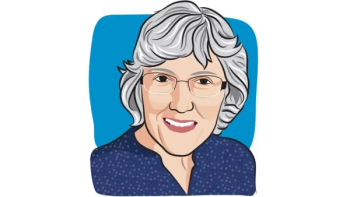
My Secret Life With Ovarian Cancer
“For so long ovarian cancer has been a secret part of my life. That’s over now.”
I recently attended a talk on the power of laughter offered by Mount Sinai Hospital’s “Woman to Woman” program. The keynote speaker spoke to us about how developing her sense of humor had been critical to keeping her hopeful in the face of a devastating stage 4 breast cancer diagnosis. It was during her first chemo treatment nearly two decades ago that she threw her first chemo “comedy party” and she has been bringing therapeutic comedy to millions of people worldwide ever since.
While it was a delightful event, I sat on the side of the room silently questioning what I’d done in the 11 years since I was diagnosed with advanced, stage 3 ovarian cancer. I am grateful that I’m still here, especially since I was told my odds of living five years were 35% — that is, if I could get past the first two years when recurrences were most common.
For most of my 11 years, I’ve kept my illness — and recovery — a secret known only to a few. What made my secrecy feel particularly uncomfortable was that for most of my life I’ve been in the business of communication. I wrote for newspapers (The New York Times, The Wall Street Journal, etc.) and went on to become editor of several national magazines (Fitness, Golf Digest Woman, etc.) while also writing for leading publications.
Suddenly, it was almost as if I had dropped off the face of the earth. At one point, I remember, I got a call from a former colleague asking me why I wasn’t applying for a job that she was certain would be perfect for me. I didn’t want to tell her that I was bald, could barely walk, and was worried I might only have months to live. I didn’t return her call.
Part of me felt always uncomfortable about being so secretive. I had always admired those who were open about their struggles with illness or created programs to help others. But as time passed, I told myself, I held back because I didn’t want to be treated with kid gloves or given special treatment. I suspected that some might be reluctant to give me work that required full commitment and stamina. Also, I wasn’t sure what I’d say when asked where I’d been, or, worse, whether I might burst into tears.
I wanted to be strong, but I often felt fragile. There were times when I cried because I was in so much pain from my multiple surgeries. On other days, as a result of losing all my hair, I worried that the wig I wore (and absolutely loathed!) would blow off in a brisk wind. On my worst days, I thought about how my family members had suffered — both my mother and brother died from cancer — and wondered what was in store for me.
Deep down, though, there was a tiny part of me that felt I could survive and I welcomed every reassuring bit of supportive advice from those few in the know. At one point, a visiting nurse urged me to think like a mountain climber. She told me to stay focused on each small step I had to make, rather than focusing on and being overwhelmed by the summit. Thus, each chemo session, each sleepless night became a step, a little victory, and somehow I kept going.
Today I have fully recovered. I look at my experience as a medical challenge I was meant to face and did. Indeed, everyone suffers from medical problems at some point, such trials are part of what it means to be alive. Yet once you have cancer, you never forget. Even though my doctor tells me I am now out of danger for a recurrence, I wouldn’t be honest if I didn’t say that fears of relapse always sneak into my thoughts, especially when I’m tired or feel a sudden ache.
As I listened to the Mount Sinai speaker, I decided to forgive myself for my secrecy. We all set our own paths in life. We don’t have to deal with our journeys in a uniform, cookie-cutter way. As I’ve told more people about what I went through, I’ve been able to help those who are newly diagnosed. I do my best to listen, guide and support them. After all, as I learned, a diagnosis is an opinion and not a prediction, and a grim diagnosis does not necessarily mean the end.
For so long ovarian cancer has been a secret part of my life. That’s over now.



